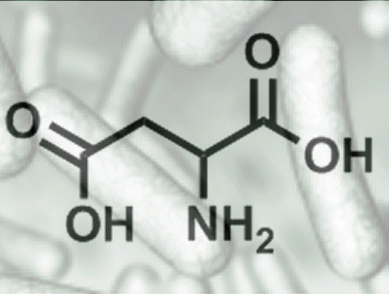Mycobacterium tuberculosis infections cause a severe pulmonary disease known as tuberculosis. Despite medical progress, each year approximately 1.5 million people still die from this illness. The eradication of the infection thus requires the development of new drugs.
To identify targets for novel antimicrobials, Alexandre Gouzy, Institut de Pharmacologie et de Biologie Structurale, Toulouse, France, investigated the metabolic pathways that promote M. tuberculosis virulence. The analysis revealed that to build nucleotides and other biomolecules that sustain the bacterial replication, M. tuberculosis need to assimilate nitrogen from the amino acid aspartate (pictured). The mycobacteria capture aspartate from the host cells through a transporter known as AnsP1. Mutant mycobacteria lacking AnsP1 failed to replicate and caused only a minor disease when injected into mice.
Targeting AnsP1 might thus be a novel and promising strategy to fight tuberculosis.
- Mycobacterium tuberculosis nitrogen assimilation and host colonization require aspartate,
Alexandre Gouzy, Gérald Larrouy-Maumus, Ting-Di Wu, Antonio Peixoto, Florence Levillain, Geanncarlo Lugo-Villarino, Jean-Luc Gerquin-Kern, Luiz Pedro Sório de Carvalho, Yannick Poquet, Olivier Neyrolles,
Nat. Chem. Biol. 2013, 9, 674–676.
DOI: 10.1038/nchembio.1355



